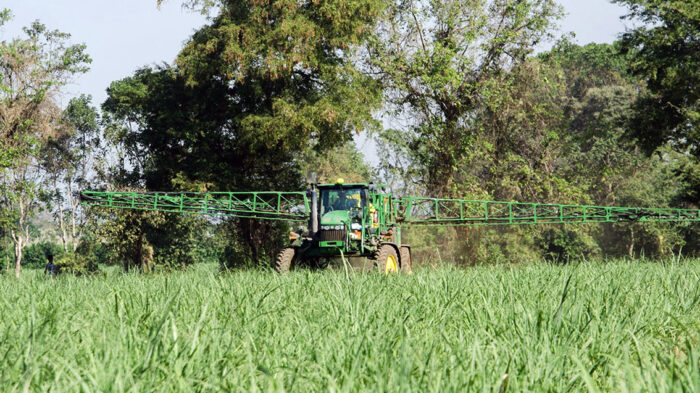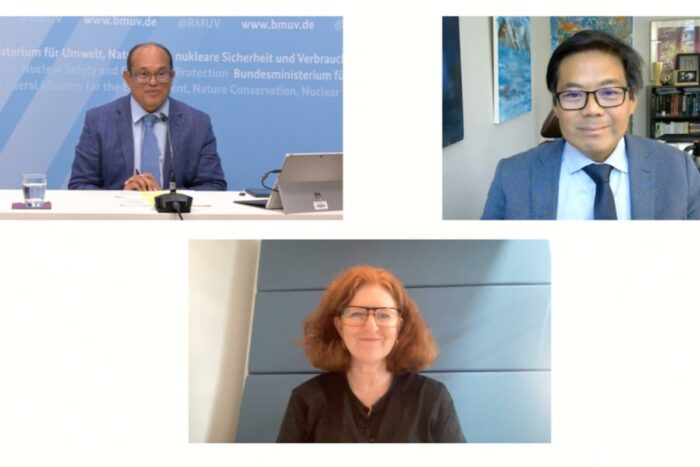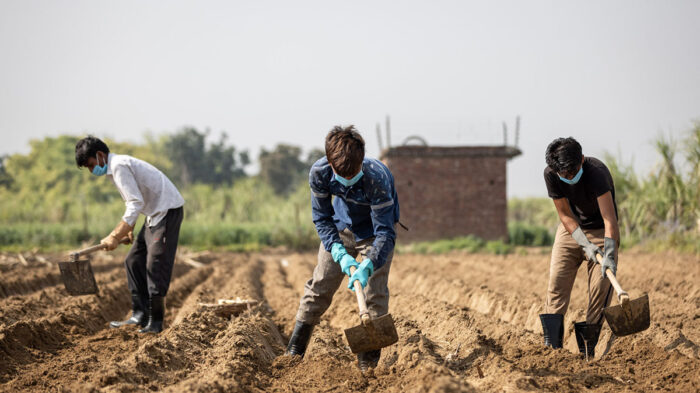18th September 2023
Written by Danielle Morley, Bonsucro CEO

Crop sprayer on a sugarcane plantation in Nicaragua, 2018
Chemical pollution affects everything and everyone. Alongside climate change and biodiversity loss, it is one of the big three planetary crisis of our times.
Across all agricultural sectors, the issue of chemicals use can be complex. How can farmers grow crops in a way that is safe for biodiversity and humans, while meeting the ever-growing pressure for productivity and supporting their own livelihoods?
Negotiating for the responsible use of chemicals
Incredibly, despite the proliferation and risks of chemical use, there is as yet no global framework for international chemical management. In 2006, the Dubai Declaration set a global goal that by 2020, “chemicals are used and produced in ways that lead to the minimization of significant adverse effects on human health and the environment.” Despite international efforts, such as the Strategic Approach to International Chemicals Management (SAICM), coordinated by UNEP, that goal hasn’t been achieved yet.
A negotiation process to develop a “Beyond 2020” new global chemical and waste framework has been underway for the last eight years. Later this month, the 5th International Conference on Chemicals Management (ICCM4) will conclude those negotiations. As the Presidency of ICCM5, the German Federal Ministry for the Environment, Nature Conservation, Nuclear Safety and Consumer Protection invited Bonsucro to contribute to a high-level political dialogue on Labour and Occupational Health.
As Bonsucro’s CEO, I spoke along with policymakers and representatives of international organisations, industry and civil society at the 2nd Berlin Forum on Chemicals and Sustainability – Just Transition towards a Pollution-Free Planet.

Credit: Earth Negotiations Bulletin, IISD. Moderator Rolph Payet, BRS Executive Secretary (upper left) with panelists Aik Hoe Lim, Director, Trade and Environment Division, WTO, and Danielle Morley, CEO, Bonsucro
I believe that sustainability systems, like Bonsucro, have an important role to play in promoting safe chemicals management in global supply chains, in line with due diligence towards human health and the environment, and our experience working with the private sector on the application of standards and facilitation of collective action for systems change, was welcomed by the organisers.
Read my contribution in the high-level dialogue:
How is Bonsucro certification improving chemical management in sugarcane?
Sugarcane supplies of 80% sugar globally. It’s grown in over 100 countries, and its production is set to increase to meet growing demand. But it’s also a crop that historically uses agrochemicals which can be hazardous to health and the environment.
Protecting the environment, keeping workers safe and reducing chemical load in food requires a long-term vision and commitment by all actors along the value chain, together with governments and civil society.
As the leading sustainability platform for sugarcane, Bonsucro brings people and organisations together to facilitate collaboration and credible evidence-based approaches to solve complex issues through stakeholder dialogue, collective action and certification.
We have codified sustainability principles for sugarcane into the Bonsucro Production Standard, against which farms and mills can become certified. Seventeen indicators govern chemical management, and they are grouped under four themes:
- Health and safety of workers
- Soil health
- Pest management
- Chemical management

Workers on a sugarcane plantation, India, 2021
The Bonsucro standard prohibits the use of harmful agrochemicals, with some limited exceptions. Together with the Intergrated Pest Management Coalition, we have a defined list of Highly Hazardous Pesticides. The list is based on recommendations by the WHO Recommended Classification of Pesticides by Hazard, the Globally Harmonized System on Classification and Labelling of Chemicals (GHS), the Stockholm Convention, the Rotterdam Convention and the Montreal Protocol. While this list doesn’t fully align with the EU banned pesticide list, our prohibited pesticide list is aligned with international regulations and guidance.
To become certified, sugarcane producers must have a health and safety management plan, safely store and dispose of chemicals, and provide appropriate personal protective equipment (PPE) and training to all workers, free of charge. Decisions must be data-led, and they must continuously improve, for example by regularly monitoring their fields for soil health and pests and using that data to develop a soil management plan, to determine appropriate chemical management strategies for their farms, the decided regulation of fertilisers, and other important decision thresholds.
Protocols that protect workers against heat stress (which increases their vulnerability to chemicals) are also codified in the standard.
As a metric-standard, we have the data to show that the application of these indicators is impactful:
- 128,000 agricultural workers and nearly 200,000 mill workers are covered by health and safety measures.
- On average, farms reduce their use of nitrogen fertilisers by 12% in the first five years after certification, while maintaining yields and reducing greenhouse gas emissions.
While the agricultural sector is a user of chemicals, it is also a producer of bio-based alternatives. Investing in innovation to unlock those alternatives is crucial.
Bonsucro is a voluntary sustainability standard, but not a silver bullet. Market demand is critical to incentivise and drive uptake of the standard by producers. While demand for certified sugarcane continues to grow, it still lags far behind supply. Addressing those commodity market inefficiencies and creating a level playing field with policy, legislation, and capacity building is vital.
Can our model be replicated in other crops and standards? Absolutely.
Sustainability systems like Bonsucro and others within the ISEAL community have valuable lessons to share on how to design, implement and govern impactful and credible voluntary frameworks.
Having members in more than 50 countries gives us a unique perspective into the sector and the different challenges across the world. We stand ready to support companies in the sugarcane value chain.
I was honoured to contribute to a dialogue that will help shape policy discussions and important negotiations on the future of chemicals. An Earth Negotiations Bulletin summary is available here.
Thank you to the Federal Ministry for the Environment, Nature Conservation, Nuclear Safety and Consumer Protection for inviting me to contribute and wish the parties good faith to negotiate a new Beyond 2020 Global Framework.
Learn more about the Bonsucro Production Standard.





